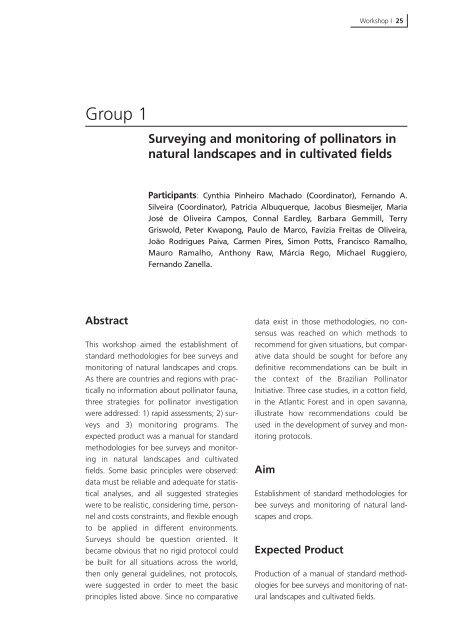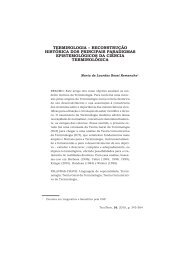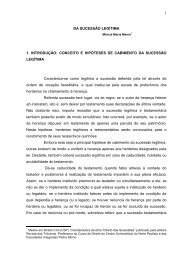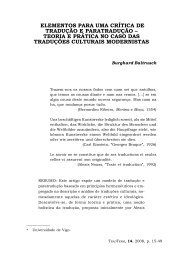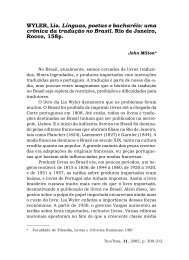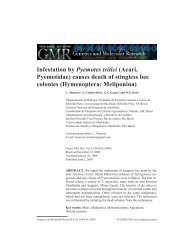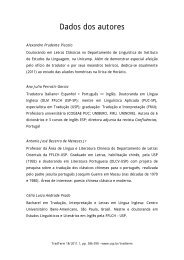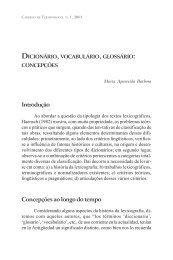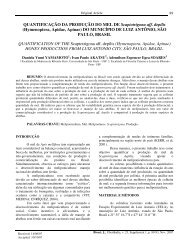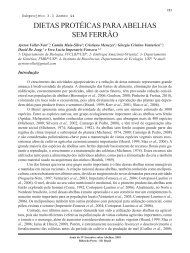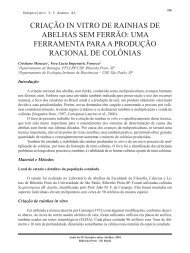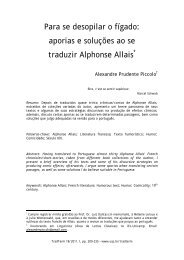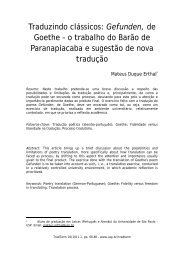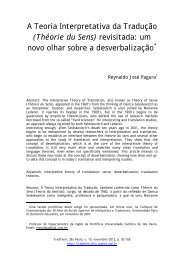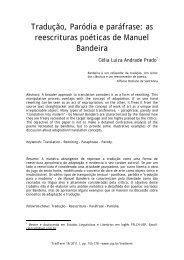Bees as pollinators in Brazil - USP
Bees as pollinators in Brazil - USP
Bees as pollinators in Brazil - USP
You also want an ePaper? Increase the reach of your titles
YUMPU automatically turns print PDFs into web optimized ePapers that Google loves.
Group 1<br />
Abstract<br />
Participants: Cynthia P<strong>in</strong>heiro Machado (Coord<strong>in</strong>ator), Fernando A.<br />
Silveira (Coord<strong>in</strong>ator), Patricia Albuquerque, Jacobus Biesmeijer, Maria<br />
José de Oliveira Campos, Connal Eardley, Barbara Gemmill, Terry<br />
Griswold, Peter Kwapong, Paulo de Marco, Favízia Freit<strong>as</strong> de Oliveira,<br />
João Rodrigues Paiva, Carmen Pires, Simon Potts, Francisco Ramalho,<br />
Mauro Ramalho, Anthony Raw, Márcia Rego, Michael Ruggiero,<br />
Fernando Zanella.<br />
This workshop aimed the establishment of<br />
standard methodologies for bee surveys and<br />
monitor<strong>in</strong>g of natural landscapes and crops.<br />
As there are countries and regions with practically<br />
no <strong>in</strong>formation about poll<strong>in</strong>ator fauna,<br />
three strategies for poll<strong>in</strong>ator <strong>in</strong>vestigation<br />
were addressed: 1) rapid <strong>as</strong>sessments; 2) surveys<br />
and 3) monitor<strong>in</strong>g programs. The<br />
expected product w<strong>as</strong> a manual for standard<br />
methodologies for bee surveys and monitor<strong>in</strong>g<br />
<strong>in</strong> natural landscapes and cultivated<br />
fields. Some b<strong>as</strong>ic pr<strong>in</strong>ciples were observed:<br />
data must be reliable and adequate for statistical<br />
analyses, and all suggested strategies<br />
were to be realistic, consider<strong>in</strong>g time, personnel<br />
and costs constra<strong>in</strong>ts, and flexible enough<br />
to be applied <strong>in</strong> different environments.<br />
Surveys should be question oriented. It<br />
became obvious that no rigid protocol could<br />
be built for all situations across the world,<br />
then only general guidel<strong>in</strong>es, not protocols,<br />
were suggested <strong>in</strong> order to meet the b<strong>as</strong>ic<br />
pr<strong>in</strong>ciples listed above. S<strong>in</strong>ce no comparative<br />
data exist <strong>in</strong> those methodologies, no consensus<br />
w<strong>as</strong> reached on which methods to<br />
recommend for given situations, but comparative<br />
data should be sought for before any<br />
def<strong>in</strong>itive recommendations can be built <strong>in</strong><br />
the context of the <strong>Brazil</strong>ian Poll<strong>in</strong>ator<br />
Initiative. Three c<strong>as</strong>e studies, <strong>in</strong> a cotton field,<br />
<strong>in</strong> the Atlantic Forest and <strong>in</strong> open savanna,<br />
illustrate how recommendations could be<br />
used <strong>in</strong> the development of survey and monitor<strong>in</strong>g<br />
protocols.<br />
Aim<br />
Establishment of standard methodologies for<br />
bee surveys and monitor<strong>in</strong>g of natural landscapes<br />
and crops.<br />
Expected Product<br />
Workshop I 25<br />
Survey<strong>in</strong>g and monitor<strong>in</strong>g of <strong>poll<strong>in</strong>ators</strong> <strong>in</strong><br />
natural landscapes and <strong>in</strong> cultivated fields<br />
Production of a manual of standard methodologies<br />
for bee surveys and monitor<strong>in</strong>g of natural<br />
landscapes and cultivated fields.


